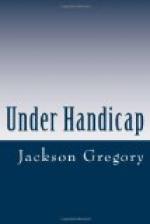“God see me through with it!” he muttered.
He fired high above their heads. The sudden report crashed through the babel of shoutings, a veritable babel into which half of the tongues of Europe mingled with Chinese and Japanese sing-song. As the crack of the gun died away all other sounds died with it. The desert grew as suddenly still as it ever is in the depths of its man-free solitudes. Staring, wondering faces which had first turned to one another turned now toward him.
Again there broke out a volley of abrupt cries, followed by as sudden a silence, as they watched him to see what he meant, what he would do. And Conniston took quick advantage of this short hush.
“Leave that wagon, every man of you!” he shouted. “Move toward the ditch. And move fast!”
No man of them stirred. Their numbers, their intoxication, gave them assurance. He was no longer the “boss.” They were all just men now, and he was only one while they were two hundred. They began to laugh. The Italian with the harmonica struck up a fresh, jigging air. The heavy-booted feet took up the rhythm. A man climbed into the wagon and scooped up a dipperful of whisky, holding it aloft before he drank.
The light was still uncertain, but the dipper was a bright, clear target. Conniston waited a moment, his teeth hard set, hardly breathing. Then, as the man lowered the dipper from his face and held it out invitingly over the heads of the men on the ground, he fired.
The bullet crashed through the tin thing, hurling it into the crowd. The man who had held it cried out aloud, and, clutching the fingers of his right hand in his left, leaped down from the wagon. The Lark rolled over and to the ground, dived between the wheels, and disappeared. And again came a sudden silence.
Now Conniston did not wait. He fired at the barrel itself, hoping to smash in the staves, to drill holes near the bottom through which the confined liquor could escape. And now the men ceased singing and dancing and leaped back, crowding away from the barrel, plunging and stumbling out of the line of bullets. For a moment Conniston thought that in that wild, headlong scramble for safety he saw the end of the thing. And almost before the thought was formed he knew better.
The men were talking sullenly. He could hear their angry, snarling voices, no longer shouting, but low-pitched. He began to make out their faces and saw nowhere an expression of fear, everywhere black wrath, restless fury. They no longer moved backward, but stood their ground, muttering. In a moment—he knew what would happen. He could read it in their faces, could sense it in their low, rumbling tones. And so he shouted to them again, his voice ringing clear above their mutterings.
“I drop the first man that takes a step this way!”
Tense, anxious, watchful, he waited. He saw hesitation, but saw, too, that the hesitation was momentary, that it would be followed by a blind rush if he could not drive fear into their hearts. And he realized with a sick sinking of his own heart that there was little fear in men like these.




